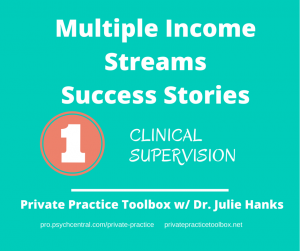 In the past, I've written about increasing revenue using multiple forms of income (income not related to direct client hours). I offered five key questions to find areas where you might be able to enjoy adding some extra income to your private practice. In this series, I want to share the successes of private practitioners who have used these concepts to find areas that not only increase their income, but help reach their ideal clients and also fuel their passions.
Amy Tatsumi, MA, LPC, found that she could garner additional income and give back to the psychotherapy community by providing supervision to others training in her field. Amy estimates that 25-30% of her income comes from supervision and consultation services.
In the past, I've written about increasing revenue using multiple forms of income (income not related to direct client hours). I offered five key questions to find areas where you might be able to enjoy adding some extra income to your private practice. In this series, I want to share the successes of private practitioners who have used these concepts to find areas that not only increase their income, but help reach their ideal clients and also fuel their passions.
Amy Tatsumi, MA, LPC, found that she could garner additional income and give back to the psychotherapy community by providing supervision to others training in her field. Amy estimates that 25-30% of her income comes from supervision and consultation services.
 “I believe that supervision and consultation are the biggest ways that I can give back as a therapist. Supporting clinicians in their journey to become sound, connected, and grounded psychotherapists has a powerful ripple effect. The supervisee, as well as all of their future clients, are impacted by the supervision process in their growth and development. In my private practice, I offer both individual and group clinical supervision and consultation for post graduate candidates and post license and seasoned practitioners in art therapy, counseling, and psychotherapy.”
“I believe that supervision and consultation are the biggest ways that I can give back as a therapist. Supporting clinicians in their journey to become sound, connected, and grounded psychotherapists has a powerful ripple effect. The supervisee, as well as all of their future clients, are impacted by the supervision process in their growth and development. In my private practice, I offer both individual and group clinical supervision and consultation for post graduate candidates and post license and seasoned practitioners in art therapy, counseling, and psychotherapy.”
To learn more about Amy and her services, visit amytatsumi.com
You might find that the fee you can charge for supervision is similar to your hourly clinical rate. I recommend researching what the standard rates are for supervisors in your area. Be sure that you are meeting all the qualifications for supervising a particular discipline as requirements differ depending on the field (social work, professional counseling, psychology, marriage & family therapy) and on in which state you practice. It is common that supervisors meet requirements for a minimum number of years of licensure or have specialized training as a supervisor. It's also important to research and understand which groups of trainees you should or should not supervise.
Income from supervision can be accomplished in a few ways. I have found in my own practice that hiring interns to meet with clients has been a successful way of creating additional income for the practice. It allows your practice to see more clients than only having one provider. You can also provide direct supervision to clinicians from other agencies. There are many times when clinicians may not have access to the type of supervisor necessary to meet the licensing requirements. They must then seek someone who can provide that. You can also provide supervision for other agencies themselves. Agencies may find that they have a need for someone to supervise employees for similar reasons that clinicians may seed outside supervision. Creating a relationship with an agency for supervision could be a consistent income stream. Consider all your options, then implement the style that works best for you.
If supervision isn't the income source you're looking for, don't worry; I'll be sharing other success stories and ideas for multiple avenues for revenue. I'd love to hear from you about areas where you have found the opportunity to generate income and, hopefully, some excitement for you.
Visit the new PrivatePracticeToolbox.net for webinars and consulting services
FREE Download Get 52 Blog Post Topics & prompts when you sign up for PPT list
Join my Private Practice Toolbox Facebook group and connect with 3200 therapists around the globe in 2 simple steps:
1) Click request to join the group and
2) Fill out this brief questionnaire before you’ll be added to the group.




As healers, we genuinely like to do our work. Guiding clients through the therapy process and seeing them make progress is why we do what we do. But if you're in private practice, you know there's a lot going on in the back end and that it's crucial to run an efficient and organized business.